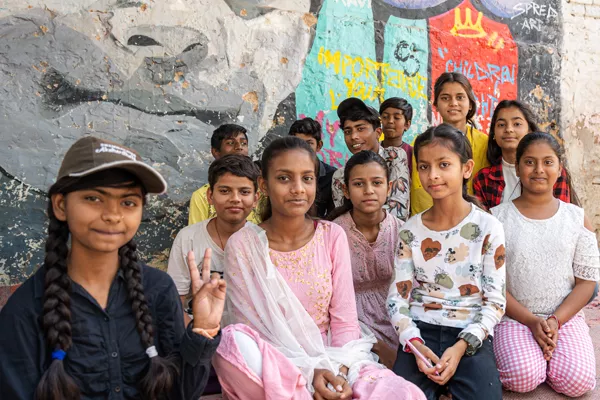Street theatre in India empowers children and youth to be agents of change

© Lydia Mantler
The teenagers gather in a circle as they start their street performance, turning a dusty courtyard in Faridabad, India, into their stage.
Meena*, 15, pretends to be a nosy neighbour forever gossiping about young girls and their morals.
“They wear jeans, and they talk about maths. Who will want to marry these girls who go to school,” says the lady with a wicked grin to her fellow neighbours.
Another teenager playing a government officer approaches the gossipers and asks if they have any daughters who can be enrolled in school. He tells them that education is free and the only way to ensure their children can be independent in the face of any calamity that life throws them.
The women whisper amongst themselves and don’t look convinced. The skit ends with a song about how sending girls to school is the only way to ensure they can live happy and fulfilled lives. The song also admonishes those who participate in idle gossip.
Meena, who wrote the script for the skit, says her experiences inspired it. When she and her sister started going to school, the women in her neighbourhood would gossip about them wearing school uniforms and make fun of their mother, telling her how difficult it would be for her to marry her daughters.
“This area where I live is a very backward area. If a girl wears jeans instead of the traditional salwar kurta or talks to a boy, the whole neighbourhood starts spreading rumours about the girl. Most girls my age want to escape from this neighbourhood because of how people think,” says Meena.
In her community, where gender norms are deeply entrenched, Meena defied stereotypes and blossomed into a confident, articulate young woman with a purpose. She boldly enrolled in the SOS Children’s Villages Children's Parliament and Street Theatre program. Through this initiative, Meena and other young people find their voices and address issues like child labour, alcoholism, and literacy.
“I learned how to speak to others respectfully and present my point of view without feeling shy or conscious,” she says. “When all the children came together and discussed issues around our neighbourhood, we felt we could change the things we didn’t like about our locality. Everything seemed easier when we did it together as a community.”
In Meena’s family, she is now seen as a confident young girl who can solve problems and engage with the outside world. This is unusual for teenagers in her community.
The Children’s Parliament is a committee of children and youth. It works like a local council, meeting regularly to discuss their concerns about school, community, and their families. Children, ages eight to 18, are mobilized to form groups and engage in numerous activities, like street theatre, to build their leadership skills and confidence, inspire their creative minds, and enable them to openly talk about issues important to them.
“With zero props and costumes, street theatre is a great way to foster creativity. It gives young people a medium to express not only their angst but also propose solutions,” says Monica, a facilitator at SOS Children’s Villages India who has been working with Children’s Parliaments and street theatre groups for over a decade.
“When we perform, sometimes the crowds do not resonate with what we are advocating. Even so, in every performance, at least two or three people will resonate with the message, and each time we repeat the message, the community starts understanding it better,” explains Meena about her experience of performing in her community.
Over 35,000 children and young people throughout India have enrolled in SOS Children’s Villages Children’s Parliaments, and street theatre groups.
“Across India, Children’s Parliaments have made children and adolescents advocates in their communities,” says Monica. “Some of the most pressing issues we have worked on across our programs are issues children feel strongly about. We see girls’ education, domestic violence, and alcoholism repeatedly addressed by children across India.”
“The Children’s Parliaments are one of the few places where we also see the value of the Sustainable Development Goals of making children and adolescents agents of change. Change is easier to accomplish when youth are at the forefront.”
*Name changed to protect privacy.

